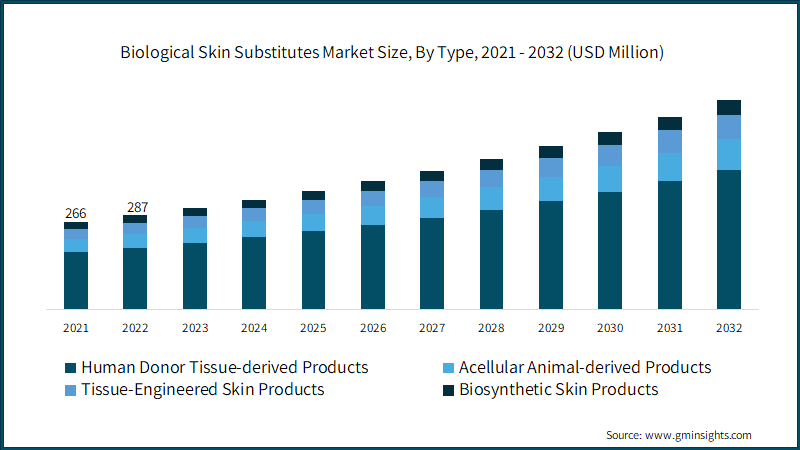Home > Healthcare > Pharmaceuticals > Finished Drug Form > Biological Skin Substitutes Market
Biological Skin Substitutes Market Analysis
- Report ID: GMI6964
- Published Date: Oct 2023
- Report Format: PDF
Biological Skin Substitutes Market Analysis
The market by type is categorized into human donor tissue-derived products, acellular animal-derived products, tissue-engineered skin products and biosynthetic skin products. The human donor tissue-derived products segment garnered USD 188 million revenue size in the year 2022. The dominance of the segment can be attributed to their exceptional biological compatibility, proven safety record, and established efficacy.
- These products closely mimic natural human skin, ensuring seamless integration and effective tissue regeneration. Furthermore, their reliability and trustworthiness have been demonstrated through extensive clinical studies and real-world applications, reinforcing their position in the market.
- With regulatory approvals and a well-structured supply chain, they are readily available and accessible to healthcare providers and patients. Moreover, higher patient preference for these products further bolsters their market dominance.

Based on application, the biological skin substitutes market is segmented into acute wounds, chronic wounds, and others. The acute wounds segment for over 59% business share in the year 2022. High segment growth is attributed to their higher incidence, immediate treatment requirements, and positive clinical outcomes.
- These wounds, including surgical incisions, traumatic injuries, and emergency cases, demand swift and effective wound care solutions, making biological skin substitutes the preferred choice.
- Additionally, these products excel in promoting rapid healing, reducing scarring, and supporting surgical procedures, especially in emergency and orthopedic contexts.
Therefore, the widespread utilization and adoption of these products in addressing acute wounds contribute significantly towards the growth of the segment.
The biological skin substitutes market by end-use is categorized into hospitals, ambulatory surgical centers, specialty clinics and others. The hospitals segment garnered USD 143 million revenue size in the year 2022.
- Hospital’s clinical expertise, state-of-the-art facilities, and skilled healthcare workforce make them the primary choice for patients with complex wounds, burns, and surgical needs.
- Furthermore, hospitals also see a high volume of patients, creating substantial demand for biological skin substitutes in various wound care applications. Thus, these products are vital in surgical procedures, emergency care, and wound management, further reinforcing hospitals' dominance in this segment.

U.S. biological skin substitutes market accounted for USD 109 million revenue size in 2022 and is predicted to witness substantial market growth over the analysis timeline.
- The U.S. has solidified its dominant position in the market, primarily attributed to the annual increase in burn injuries. The American Burn Association reports around 486,000 yearly burn injuries, with 40,000 of these cases requiring hospitalization.
- Furthermore, U.S. advanced healthcare infrastructure, leadership in innovative medical practices, high surgical volumes, and accessibility to advanced products contribute to its central role in the market.

